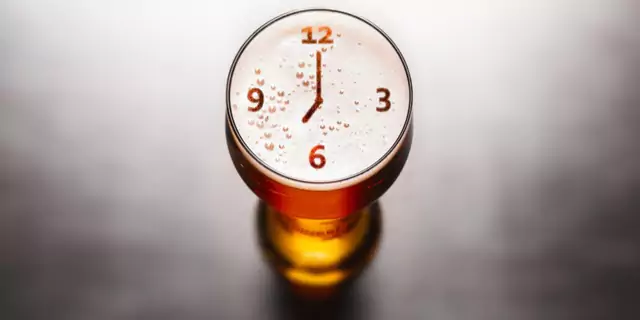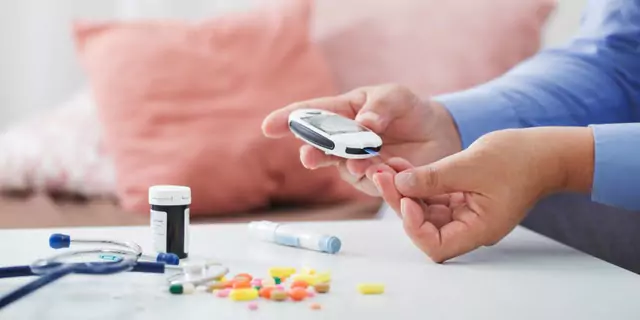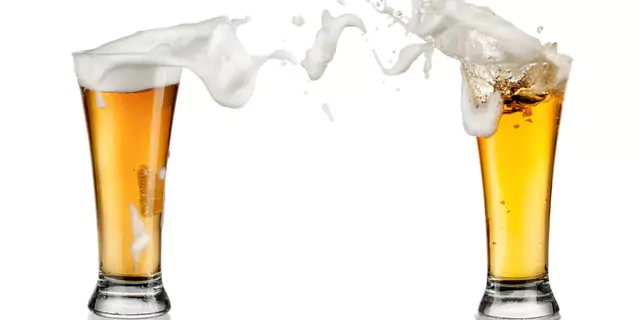Alcohol and Blood Sugar: The Impact of Drinking

Key Takeaways
With the holidays upon us, you're probably not thinking twice about indulging in an alcoholic beverage here and there. And for most of us, there’s nothing wrong with that! However, if you suffer from health conditions, you may need to be a little more cautious about how much alcohol you’re drinking.
For people with diabetes or those trying to control and regulate their blood glucose, alcohol consumption can pose a bit of a risk. This is because alcohol affects blood sugar levels and can also impair the efficacy of certain medications. If you don't stop to consider the effect every glass of alcohol has on your body, it's likely because you don’t have a health condition that compels you to. But if you have type 1 or type 2 diabetes or know you’re prediabetic, you may need to pay more attention.
Studies have shown that alcohol can affect those with diabetes in dramatically different ways. People with diabetes who have a consistent, healthy diet find that drinking alcohol may result in extremely high blood sugar levels. People with diabetes who do not have a healthy, balanced diet may find that alcohol consumption results in very low blood sugar levels. Heavy drinking can also cause certain acids to accumulate in the bloodstream of those with diabetes.
Interestingly, how alcohol affects your blood sugar levels also depends on whether or not you have recently eaten. A study conducted on these two states while drinking found that participants who had eaten saw higher blood sugar levels. Those who hadn’t eaten or were in fasting states were at a higher risk of experiencing hypoglycemia. Wondering how alcohol affects you and how you might be able to safely indulge every once in a while? Read on to find out.
The Role Your Liver Plays in Moderating Your Blood Sugar
To understand how alcohol impacts glucose, it’s essential to first understand the liver’s role in maintaining stable glucose levels. The liver plays a huge role in blood sugar circulation and control. Your liver is actually a storage place for glucose and helps your system keep your body’s fuel levels stable.
Not only does your liver store glucose for when your body requires it, but it can create glucose through a process called glycogenolysis. Glycogenolysis is when your liver takes glycogen and turns it into glucose. It can also make glucose by using amino acids, fat, and waste which is called gluconeogenesis.
How Alcohol Impacts the Liver’s Ability to Release Appropriate Amounts of Glucose

When you consume alcohol, your blood sugar levels may drop because you’re inhibiting your liver’s ability to release glucose from its storage or create more. Initially, alcohol can often lead to a spike in your sugar levels, which your body will race to process and may metabolize too quickly. This is why your blood sugar may actually drop when consuming alcohol [this is without factoring in sugary mixers, of course]. While your body struggles with the spike that alcohol sends to your liver, it cannot release glucose properly because it is, simply put, overwhelmed.
Different types of alcohol factor in as well. Beer, which is very carb-heavy, causes more immediate and more drastic spikes in glucose levels. Sugary cocktails can be glucose bombs. Sweeter wines are also known to cause spikes. However, liquor on its own and some types of dryer wines may affect the liver differently and result in glucose drops, or no drop or spike at all!
How Long Does Alcohol Affect Your Blood Sugar?

The impact of alcohol may last more than just in the moment, with ranges changing up to 12 hours after drinking. The initial spike and/or dip in blood sugar can occur over one or two hours after consuming the beverage, but the effect can last much longer. Because the body has no storage space for alcohol, alcohol is oxidated first. This means that anything consumed with that alcohol drink will be put “on the back burner,” so to speak, causing ongoing changes in glucose. This can mean higher values the entire night and into the next day after drinking for many people.
Other Effects on The Body Related to Blood Sugar, Alcohol, and Diabetes
Responses to alcohol can differ from person to person, and it’s an interesting idea to experiment a little bit to see how your body responds to different types. But if you have diabetes, you may not want to make any drastic changes without consulting your doctor. In the meantime, here are a few other effects alcohol can have on your body and your blood glucose levels.
Stimulates Hunger Resulting in Potential Weight Gain

- Alcohol can be an appetite stimulant. This may result in overeating while imbibing and consuming more calories than your body truly needs.
- Alcohol also inhibits your judgment after consumption and can lead you to make snap decisions about the foods you consume while you’re drinking. This can also lead to some blood sugar spikes.
- Alcohol itself is high in calories, and if you’re trying to lose weight, you may want to consider drinking less of it. If you’re drinking alcohol, stick to low-sugar mixers!
Alcohol Reduces the Effectiveness of Diabetes Medications

- If you’re on diabetes medications, you should be more cautious when you’re drinking alcohol. Some medicines are made to help your body lower your blood sugar levels. When paired with alcohol, the combination can cause hypoglycemia or insulin shock. When your blood levels drop too quickly, your body can go into literal shock, leading to a medical emergency.
- If you’re on diabetic medication, it’s a good idea to talk to your doctor before indulging to ensure it is safe to do so and how to find the right balance if so.
It Can Increase Blood Pressure

- If you have high blood pressure, you may want to avoid drinking alcohol as it can worsen the issue.
- In a healthy adult, three drinks in one sitting can lead to high blood pressure. Long-term effects can be seen among adults who repeatedly binge drink [binge-drinking is consuming four, five, or more drinks within two hours]. Using a CGM can help you find your body’s tolerance when you’re drinking more than one beverage in a single sitting.
- Alcohol also contains a significant amount of calories and can stimulate your appetite. Being overweight or suddenly gaining excessive weight can also lead to high blood pressure.
Alcohol Can Damage the Pancreas [Which Creates Insulin]

- Alcohol is an inflammatory agent, and consumption may result in inflammation of the pancreas. Your pancreas is the organ that creates insulin for the body. If it becomes inflamed, that production and release can be threatened, leading to insulin deficiencies.
- If you have diabetes, this poses an immediate risk, but too much damage over time can also cause diabetes in some people.
- Excessive alcohol consumption is also linked to pancreatitis. This is when the pancreas becomes so inflamed that it prevents healthy digestion.
Excess Alcohol Puts Pressure on Other Organs [Lungs, Kidneys, Skin, Etc.]

Alcohol doesn’t just affect your liver; it can affect your other organs too. Here’s just a few ways it can do this:
- How it affects your heart: Over-drinking can cause cardiomyopathy, arrhythmias, strokes, and high blood pressure.
- How it affects your brain: Alcohol affects your neural pathways, changing how your brain functions. This can lead to behavioral changes when you’re indulging as well as while the alcohol is still in your system.
- How it affects your immune system: Drinking too much can weaken your immune system, leaving you vulnerable to viruses and infections.
It Can Impair Sleep Quality

- Alcohol may reduce REM sleep and cause sleep disruptions. This makes some people fall asleep too quickly, hitting deep sleep instead of progressing through all the natural sleep states, leading to insomnia.
- Drinking alcohol has been linked to developing sleep apnea, which occurs when you have lapses in your breathing patterns during sleep.
- The body can perceive alcohol as a stressor, causing increased glucose output and reductions in insulin sensitivity. Both these factors can result in higher glucose values overnight and the following day.
- A recommendation to consider is trying not to consume alcohol four hours or more before bedtime.
Find the right Nutrisense programto turn insight into progress.
Go Beyond Glucose Data with Nutrisense
Your glucose can significantly impact how your body feels and functions. That’s why stable levels are an important factor in supporting overall wellbeing. But viewing glucose isn't enough. Nutrisense, you’ll be able to learn how to use your body's data to make informed lifestyle choices that support healthy living.
One-to-one coaching
Sign up to access insurance-covered video calls to work with a glucose expert: a personal registered dietitian or certified nutritionist who will help tailor your lifestyle and diet to your goals.
Monitor and measure what matters
With the Nutrisense CGM Program, you can monitor your glucose with health tech like glucose biosensors and continuous glucose monitor (CGM)s, and analyze the trends over time with the Nutrisense App. This will help you make the most informed choices about the foods you consume and their impact on your health.
Find your best fit
Ready to take the first step? Start with our quiz to find the right Nutrisense program to help you take control.

Kara Collier is a registered dietitian nutritionist and certified nutrition support clinician who is passionate about reshaping how we approach prevention, behavior change, and metabolic health. A Forbes 30 Under 30 honoree, she’s helped over 150,000 people improve their metabolic health using tools like continuous glucose monitors and behavior-focused nutrition strategies. Kara has been featured by Forbes, UC Berkeley, and HLTH, and has appeared on top podcasts like Mind Pump and The Genius Life.




